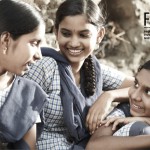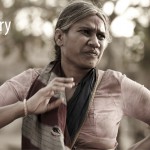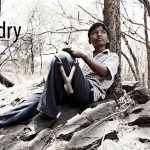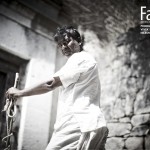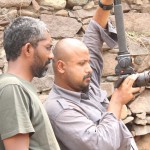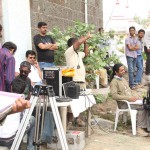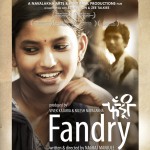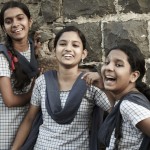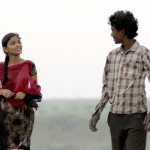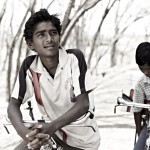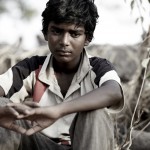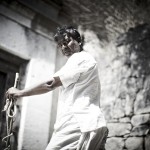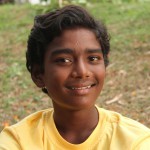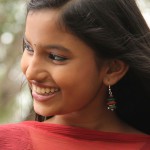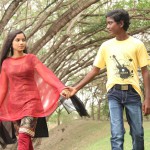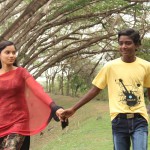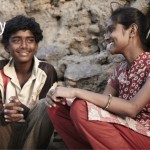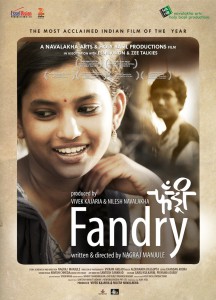 This critically acclaimed Marathi social drama tells the story of a schoolboy, Jabya, who lives in a small village in Maharashtra, as a member of a despised tribal community set outside of the caste system. His frustration from the surrounding oppression grows every day, and is strengthened by his strong affections for a girl belonging to a high caste.
This critically acclaimed Marathi social drama tells the story of a schoolboy, Jabya, who lives in a small village in Maharashtra, as a member of a despised tribal community set outside of the caste system. His frustration from the surrounding oppression grows every day, and is strengthened by his strong affections for a girl belonging to a high caste.
Trailer Fandry with English subtitles.
2013 – 101 min – drama
Directed by: Nagraj Manjule
Cast: Somnath Awghade, Sanjay Chaudhri, Chhaya Kadam
Language: Marathi
Subtitles: Czech, English
Format: DCP
Although the caste system and the discrimination associated with it is one of the first things that people typically associate with India, surprisingly this topic is not reflected too often in Indian cinema. Among the famous exceptions are for instance Achhut Kannya (1937) by the German Franz Osten, Sujata (1959) by Bengali master of melodramas that criticize society, Bimala Roy, and Bandit Queen (1994) by Shekhar Kapur. But Fandry isn’t a Bollywood production, it belongs to the gradually maturing wave of Marathi social dramas. Its main difference from the above mentioned films by famous Directors is above all the subtlety of the language and the fineness with which the topic is dealt with.
Debuting director Nagraj Manjule put aside the traditionally constructed dramatic path in order to build his film according to the rules of observational realism, which usually relies on the careful monitoring of seemingly ordinary issues of a small group of characters. Fandry focuses mainly on the experiences and feelings of Jabya, a boy of school age, who has a hard time putting up with his inferior social position, which he is reminded of at every step. His family belongs to the nomadic tribe Kaikadi – one of the many Indian ethnic groups, whose caste position put outside of the basic four varnas (de facto social classes), forcing them to perform work considered unclean and unworthy of the higher castes. Nomadic tribes also bear a stigma from the era of the British colonial rule, when the authorities legislatively restricted their civil rights, basing their decision on the claim that by their nature, they have a tendency to criminality.
Manjule, who himself comes from the nomadic tribe Wadar, adorns the socially critical aspect with poetic elements, and with symbolism partly based on the Marathi folk culture. The theme of social humiliation is embodied in the film by the wild pigs (called “Fandry” in the Kaikadi language), which Jabya and his family must catch, to the great amusement of the villagers. And the only thing that gives the young hero hope for a better life (and for the heart of his classmate from a high caste) is the legend about a black sparrow and his magical powers.
In India, Fandry received a warm welcome by critics (who traditionally favor realist social dramas rather than popular genre films) and was awarded at several festivals – both at home and abroad, at festivals devoted to Indian cinema. At the prestigious National Film Awards, held under the direct patronage of the Government, it received the award for best directorial debut and best child actor (for the actor who played the role of Jabya Somnath Awghade).
Author: Miroslav Libicher
About the director
Born and brought up in Karmala, a very small town of Sholapur district i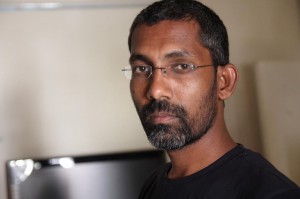 n Maharashtra, he has closely seen how one has to struggle while getting an education if one belongs to a poor, backward family of a rural India. His First National Award winning short film ‘PISTULVA’ is a reflection of his ‘felt experience’. He has pursued his masters in Marathi literature at the Pune University and Masters In communication studies at the New art, science and commerce college Ahmednagar. He is one of the best and most important poets of Marathi literature in the last decade. His collection of poems ‘Unhachya Kataviruddha’ has received a very warm welcome in contemporary Marathi literature, and his book won the very renowned ‘Damani literary Award’, also praised by the stalwarts from Marathi literature.
n Maharashtra, he has closely seen how one has to struggle while getting an education if one belongs to a poor, backward family of a rural India. His First National Award winning short film ‘PISTULVA’ is a reflection of his ‘felt experience’. He has pursued his masters in Marathi literature at the Pune University and Masters In communication studies at the New art, science and commerce college Ahmednagar. He is one of the best and most important poets of Marathi literature in the last decade. His collection of poems ‘Unhachya Kataviruddha’ has received a very warm welcome in contemporary Marathi literature, and his book won the very renowned ‘Damani literary Award’, also praised by the stalwarts from Marathi literature.
